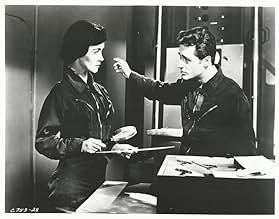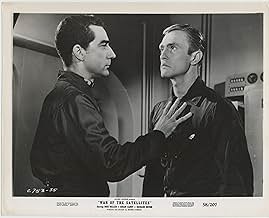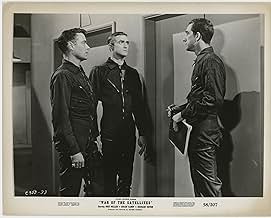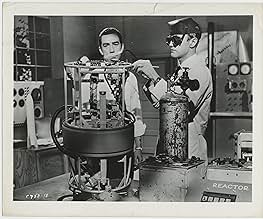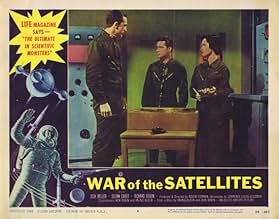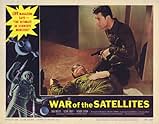CALIFICACIÓN DE IMDb
5.1/10
1.3 k
TU CALIFICACIÓN
Agrega una trama en tu idiomaAn "unknown force" declares war against planet Earth when the United Nations disobeys warnings to cease and desist in its attempts at assembling the first satellite in the atmosphere.An "unknown force" declares war against planet Earth when the United Nations disobeys warnings to cease and desist in its attempts at assembling the first satellite in the atmosphere.An "unknown force" declares war against planet Earth when the United Nations disobeys warnings to cease and desist in its attempts at assembling the first satellite in the atmosphere.
- Dirección
- Guionistas
- Elenco
Jered Barclay
- John Compo
- (as Jerry Barclay)
Jim Knight
- Reporter
- (as James Knight)
Pat Clement
- Reporter
- (sin créditos)
Roger Corman
- Ground Control
- (sin créditos)
James Gonzalez
- Technician
- (sin créditos)
- Dirección
- Guionistas
- Todo el elenco y el equipo
- Producción, taquilla y más en IMDbPro
Opiniones destacadas
Typically fast and cheap early Roger Corman sci-fi epic was put together in a hurry in order to capitalize on the launching of the Soviet satellite Sputnik, and the subsequent efforts of the United States to launch a satellite of their own. Lawrence L. Goldman wrote a script (based on a story by Jack Rabin and Irving Block), about the United Nations repeatedly failing with their space exploration missions. A hostile alien intelligence wants Earthlings to cease and desist with these missions, or else. Our intrepid heroes, naturally, become more determined than ever to succeed, and send a pair of rockets into outer space. But the aliens are ready to sabotage the mission.
The not so special effects and the minimum of sets merely serve to add to the fun factor of this Corman quickie. It sure as hell isn't anything great, but then it doesn't try to be. It's an amusing, fast paced, decently acted Allied Artists production that has a certain charm that often came with the low budget genre movies of this period. It's impossible to dislike, especially considering the way that Corman is slyly injecting some commentary about the Cold War as part of the package. Cormans' constant collaborators during this time, production designer Daniel Haller and cinematographer Floyd Crosby, do the best that they can with their minimal budget, and the music by Walter Greene is highly enjoyable. The acting is pretty good from all concerned: Richard Devon is effective as the determined Dr. Pol Van Ponder, Susan "The Wasp Woman" Cabot appealing as leading lady Sybil Carrington. Eric Sinclair as Dr. Howard Lazar, Robert Shayne as Cole Hotchkiss, Jered Barclay as John Compo, and Bruno VeSota as Mr. LeMoine comprise a fine supporting cast. But the primary appeal of "War of the Satellites" is the opportunity to see the legendary Dick Miller in not just a leading role, but a *heroic* leading role, as brave scientist Dave Boyer.
These 66 minutes go by quickly and engagingly.
Seven out of 10.
The not so special effects and the minimum of sets merely serve to add to the fun factor of this Corman quickie. It sure as hell isn't anything great, but then it doesn't try to be. It's an amusing, fast paced, decently acted Allied Artists production that has a certain charm that often came with the low budget genre movies of this period. It's impossible to dislike, especially considering the way that Corman is slyly injecting some commentary about the Cold War as part of the package. Cormans' constant collaborators during this time, production designer Daniel Haller and cinematographer Floyd Crosby, do the best that they can with their minimal budget, and the music by Walter Greene is highly enjoyable. The acting is pretty good from all concerned: Richard Devon is effective as the determined Dr. Pol Van Ponder, Susan "The Wasp Woman" Cabot appealing as leading lady Sybil Carrington. Eric Sinclair as Dr. Howard Lazar, Robert Shayne as Cole Hotchkiss, Jered Barclay as John Compo, and Bruno VeSota as Mr. LeMoine comprise a fine supporting cast. But the primary appeal of "War of the Satellites" is the opportunity to see the legendary Dick Miller in not just a leading role, but a *heroic* leading role, as brave scientist Dave Boyer.
These 66 minutes go by quickly and engagingly.
Seven out of 10.
Famously concocted in 8 weeks after director Roger Corman promised Allied Artists a "satellite' movie in time to cash in on America's fascination with (or fear of ) Sputnik, 'War of the Satellites' really has nothing to do with the cold war or the Russian space program or, for that matter, any other reality. Briefly, Earth's attempts to put people in orbit are met with disaster when the ships approach a mysterious barrier and we are warned by the "Masters of the Spiral Nebula Ghana" that humans have been prohibited from exploring space. To ensure our compliance, the aliens kill the head of the space program, Dr. Van Ponder (Richard Devon), and replace him with a sinister doppelganger. Astronomer David Boyer's (Corman perennial Dick Miller) suspicions concerning his new boss leads to a show-down in outer space, the outcome of which could determine the future of humanity. There are some adequate special effects shots, such as the rocket base or the in-orbit assembly of a space station but other than these, the film is strictly a dime-store production, especially the interiors the space ships (featuring recliner lounges with seatbelts) or the flimsy looking control panel manned by none other than Corman himself). The plot/script makes little sense and, other than Miller and Devon, the acting is underwhelming. Typical for a Corman picture, 'War of the Satellites' turned a profit and remains watchable today (half a century after Sputnik fell out of the sky) in a chintzy sort of way.
This is cut-rate science fiction from Allied Artists and producer-director Roger Corman. The United Nations space program involving launching manned spacecraft into outer space is met with defeat after defeat as a strange energy barrier surrounding the planet destroys any craft that gets too close. One last chance is taken with an experimental solar device which will hopefully subvert the energy field, only unbeknownst to the programs members, the proposed captain (Richard Devon) has been replaced by an alien duplicate bent on stopping human efforts in space exploration once and for all.
This was rushed out in reportedly eight weeks, from conception to theaters, in an effort to cash-in on the Sputnik launch in the news. The special effects aren't very special, and a good bit of the film's final third is comprised on people walking back and forth through the same 10-foot stretch of ship corridor. But I liked seeing Richard Devon, a familiar character actor, in a lead role, and there are some fun moments when his true alien nature pops up. Longtime Corman regular Dick Miller gets one of his very few heroic leading man roles, and he uses a more serious voice than normal, much to my amusement. Susan Cabot acts a bit like a robot. This movie is no one's idea of high art, but it hit enough of the right B-movie buttons for me to be entertaining.
This was rushed out in reportedly eight weeks, from conception to theaters, in an effort to cash-in on the Sputnik launch in the news. The special effects aren't very special, and a good bit of the film's final third is comprised on people walking back and forth through the same 10-foot stretch of ship corridor. But I liked seeing Richard Devon, a familiar character actor, in a lead role, and there are some fun moments when his true alien nature pops up. Longtime Corman regular Dick Miller gets one of his very few heroic leading man roles, and he uses a more serious voice than normal, much to my amusement. Susan Cabot acts a bit like a robot. This movie is no one's idea of high art, but it hit enough of the right B-movie buttons for me to be entertaining.
For those who enjoy the schlock scifi spectrum of cinema, this Roger Corman epic will be fun and interesting. And by 1958 Corman standards, this film is indeed an epic...it has at least 3 different sets as opposed to the usual 1 or 2, and has hundreds of feet of stock footage from other films, greatly expanding upon Corman's usual trailer park scope of action. There are a number of curiosities about this film.
Of particular note is the footage containing matte-paintings of rocketships, and the rocket miniature FX footage...these segments look nothing like typical Corman stuff, being almost barely acceptable. Corman loved to buy foreign movies on the cheap, and the rockets look like the ones from an old Italian pic...I bet you a nickel all the exterior rocket shots are from a foreign film Corman bought.
There's also a strange comedy relief bit in which 2 necking teenagers find a small alien artifact...one of the teens is young Mitzi McCall, whose career occasionally flirted with modest success...anyway, this bit is totally out of tone with the rest of the film...it must have been filmed either before or after the rest of the movie and edited in. This short sequence does provide information and advance the plot, but the rest of the film is so deadly serious that this sequence is bizarre. It does hint at the horror/scifi comedies that were just around the corner for Corman.
The deadly serious and low key tone is effective for an invasion/paranoia story. Richard Devon is very effective in his portrayal of an ambivalent alien invader disguised as an Earth scientist. The loyal and long-suffering Dick Miller does an unusual turn as a square-jawed hero, and although he is noticeably shorter than the villain, his performance does not come up short.
The title of this film is often discussed. IMO, the idea of calling the film 'War of the Satellites', besides capitalizing on the newly popular term, also evokes the Cold War. In 1957, the USA considered the Soviet satellite Sputnik as a veiled threat...and the frantic haste of the USA to launch its own satellite was in fact a counter-move in the Cold War. Therefore, at the time of this film's production, a real War of the Satellites had already begun...on Earth.
It is not unusual for Corman's films to contain a degree of thinly-veiled political commentary.
Here is a great quote, spoken by one of the astronauts, after the evil alien invader has offered him a chance to join the aliens: 'You can go to Hell! I was born a human and I'll die one before I join a race that kills innocent people for abstract ideas!'
Of course, that line is highly ironic...human beings kill innocent people all the time over abstract ideas, such as capitalism, communism, democracy, fascism, Christianity, Islam, etc.
Of particular note is the footage containing matte-paintings of rocketships, and the rocket miniature FX footage...these segments look nothing like typical Corman stuff, being almost barely acceptable. Corman loved to buy foreign movies on the cheap, and the rockets look like the ones from an old Italian pic...I bet you a nickel all the exterior rocket shots are from a foreign film Corman bought.
There's also a strange comedy relief bit in which 2 necking teenagers find a small alien artifact...one of the teens is young Mitzi McCall, whose career occasionally flirted with modest success...anyway, this bit is totally out of tone with the rest of the film...it must have been filmed either before or after the rest of the movie and edited in. This short sequence does provide information and advance the plot, but the rest of the film is so deadly serious that this sequence is bizarre. It does hint at the horror/scifi comedies that were just around the corner for Corman.
The deadly serious and low key tone is effective for an invasion/paranoia story. Richard Devon is very effective in his portrayal of an ambivalent alien invader disguised as an Earth scientist. The loyal and long-suffering Dick Miller does an unusual turn as a square-jawed hero, and although he is noticeably shorter than the villain, his performance does not come up short.
The title of this film is often discussed. IMO, the idea of calling the film 'War of the Satellites', besides capitalizing on the newly popular term, also evokes the Cold War. In 1957, the USA considered the Soviet satellite Sputnik as a veiled threat...and the frantic haste of the USA to launch its own satellite was in fact a counter-move in the Cold War. Therefore, at the time of this film's production, a real War of the Satellites had already begun...on Earth.
It is not unusual for Corman's films to contain a degree of thinly-veiled political commentary.
Here is a great quote, spoken by one of the astronauts, after the evil alien invader has offered him a chance to join the aliens: 'You can go to Hell! I was born a human and I'll die one before I join a race that kills innocent people for abstract ideas!'
Of course, that line is highly ironic...human beings kill innocent people all the time over abstract ideas, such as capitalism, communism, democracy, fascism, Christianity, Islam, etc.
Years ago, I remember seeing this movie on a local syndicated TV station. I had completely forgotten about it until I came across a website writing a review about the movie. I tried to find the video but came up empty. After searching for quite awhile, I eventually found a copy. What I can't figure out is that "War of the Satellites" was a project of Roger Corman, a somewhat well known producer and director of low budget sci fi horror films of the 50's and 60's. This science fiction thriller which probably took 2 weeks to make, has a remarkably effective storyline combined with so-so special effects for that time period. This movie is hard to find and if you do happen to locate it, I would suggest getting it because it's not that bad of a rotten tomato.
¿Sabías que…?
- TriviaFrom the time this movie was conceived, it was reportedly only eight weeks later that the completed movie was playing in theatres.
- ErroresWhen Susan Cabot enters the "solar energy room," she opens the door from her right-hand side. When Richard Devon follows her in, he opens the door from his left-hand side.
- Citas
Dr. Pol Van Ponder: There's an old saying. "If you just want something, send someone for it. But if you really want it, go yourself".
- ConexionesEdited into La bestia infernal (1958)
Selecciones populares
Inicia sesión para calificar y agrega a la lista de videos para obtener recomendaciones personalizadas
- How long is War of the Satellites?Con tecnología de Alexa
Detalles
Taquilla
- Presupuesto
- USD 75,000 (estimado)
- Tiempo de ejecución1 hora 6 minutos
- Color
- Mezcla de sonido
- Relación de aspecto
- 1.37 : 1
Contribuir a esta página
Sugiere una edición o agrega el contenido que falta

Principales brechas de datos
What is the Spanish language plot outline for Guerra de satélites (1958)?
Responda

